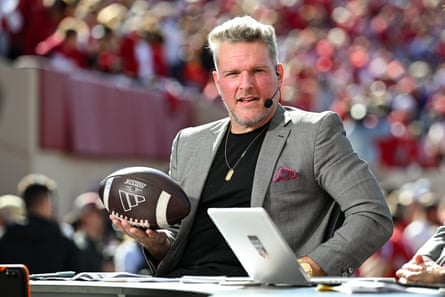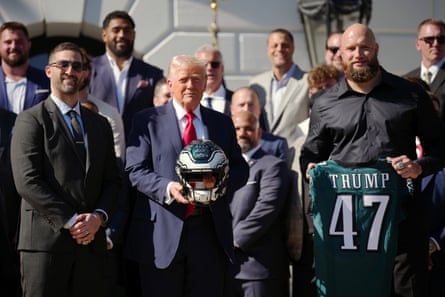By extension of the Trump-aligned ‘manosphere’, figures such as ESPN’s Pat McAfee have upended US culture with their brash, hypermasculine punditry

This February, Pat McAfee was broadcasting live on ESPN, the most watched sports network in the US, when he aired a salacious rumor about the sex life of a teenage college student. Once a workaday punter with the Indianapolis Colts, McAfee is now the most influential pundit in American sports with an eponymous ESPN show, who has more than 11m followers across YouTube, X, Instagram and TikTok.
To howls of merriment from his panel, McAfee spelled out the rumor centered on a 19-year-old female student at Ole Miss, a public university in Mississippi, as it was “being reported by everybody on the internet”: that the student had sex with her boyfriend’s father. “Ole Miss dads are slinging meat right now!” roared “Boston” Connor Campbell, one of McAfee’s sidekicks.
McAfee did not directly name Mary Kate Cornett, the college freshman at the center of the rumor, but she has since described how McAfee’s amplification of this “completely false” story encouraged others in the sports talk world to do likewise, resulting in her receiving a deluge of threats and harassment. Cornett has engaged lawyers to explore suing McAfee, ESPN and others involved in spreading the rumor for defamation. McAfee appeared moderately chastened by the episode: “I never, ever want to be a part of anything negative in anybody’s life, ever,” he said recently while addressing the outrage that his boosting of the rumor prompted. But he has not yet apologized, and in no way does his future as one of ESPN’s most bankable stars seem in jeopardy. Whatever blowback ensued has blown right on by.
The whole episode served as a demonstration of power: the world of sports influencers such as McAfee, which is particularly influential among young men and can be understood as an extension of the Donald Trump-aligned “manosphere”, now stands as an important bastion of the culture of insensitivity and entitlement on which Trumpism thrives.

A new generation of sports talk stars
The Pat McAfee Show, a two-to three-hour afternoon blast of high-volume sports chat, sweating and raw, uncomplicated American male heterosexuality, launched in 2019. It has quickly become a favored media stop for many of the top names in US sports and culture. Tom Cruise spent 30 minutes on the show recently (“I appreciate the shit outta you,” McAfee told Cruise); LeBron James stopped by for an hour.
Throughout the show’s history, McAfee has courted controversy: he’s called WNBA star Caitlin Clark a “white bitch”, he’s made jokes about child abuse, he’s helped air rumors linking celebrities to Jeffrey Epstein. None of it seems to matter: McAfee, whose show moved to ESPN on a five-year, $85m deal in 2023, powers on unperturbed, growing in cultural might with each passing month.
McAfee is now the avatar of a new generation of sports talk stars who have upended the rules about public speech, remade culture in their own brash image, and are completely bulletproof.

Among McAfee’s peers in this dripped-out new world of costless needling are Barstool Sports boss Dave Portnoy; former NFL players Will Compton and Taylor Lewan, who co-host the show Bussin’ With the Boys; and NFL receiver-turned-podcaster Antonio Brown. Sports are also a major, though not exclusive, topic of conversation for Joe Rogan, Theo Von and other leaders of the manosphere. The Wikipedia pages of many of these figures contain hefty “controversy” tabs. Portnoy has faced extensive and credible accusations of sexual misconduct; Brown refers to WNBA star Clark, an athlete on whom the anti-woke right seems psychotically fixated, as “Cousin Itt”, referencing the Addams Family’s hirsute, non-verbal relative, and is so crassly sexist online that even the famously feminist redoubt of Barstool Sports has described him as a “crackpot”.
In an earlier era, reckless promotion of tasteless gossip about a teenager’s sex life might have been enough to sink a career like McAfee’s. Provocation, abrasiveness and a delight in offending have been essential to sports talk – on radio and cable TV – for decades. But in the years before social media, on-demand programming and betting turned sports into an all-hours, all-platforms juggernaut, there were still lines that sporting pundits could not cross: shock jock Don Imus, for instance, built his career on being outspoken but was fired by WFAN/MSNBC in 2007 after making racist and misogynist comments including describing the Rutgers women’s basketball team as “nappy-headed hos”.
Today’s sports broadcast world runs according to a new set of rules, in which “respectable” TV and the demi-monde of sports podcasts, streaming, and shitposting increasingly intersect: all engagement is good engagement, and the best type of filter is no filter. Whatever faint norms of decorum constrained earlier generations of professional sports talkers have faded completely.
There’s a reciprocal flow of testosterone and ideas between these shows, the world of sports, social media and real life. A handful of subjects and themes recur: veneration of the military, glorification of strength and traditional “male” values, celebration of gambling, the denigration of women and anything thought to represent “woke” culture. On any given day across the sporting bro-zone you might hear Bussin’ With the Boys and their guests rail against pronouns and cancel culture, the hosts of Barstool Sports’ Pardon My Take podcast argue Taylor Swift needs to “release a sex video” to make her presence at NFL games tolerable to the average male fan, or McAfee devote 30 minutes (as he did recently) to describing his day among “maybe the baddest motherfuckers on earth”: the drill instructors at the US Marine Corps training center on Parris Island in South Carolina. These interests and obsessions mirror the president’s cultural politics, turning the sports bros into critical emissaries for Trump’s peculiar brand of popularly elected vandalism.
It’s worth questioning, of course, how influential these influencers really are. A recent poll from the Harvard Kennedy School’s Institute of Politics found that 35% of young men had an unfavorable view of Rogan, while a further 36% had never heard of him or did not know enough about him to have an opinion. The much-rehearsed idea that the minds of young male voters have been irretrievably colonized by the manosphere is surely overblown.
But there seems little dispute that these influencers have been effective in platforming rightwing figures and ideas. The sports bros are an essential part of that legitimizing apparatus – all the more so because their endorsement of the right’s reflexes, priorities and modes of attack is couched in the ostensibly apolitical language of sports. The cultural supremacy of the sports bros is now so total that Barstool’s Dave Portnoy is now famous for his online pizza reviews that can make or break restaurants in America. When a casual day trader from Massachusetts who built his media empire on college gambling advice becomes the arbiter-in-chief of America’s favorite food, something fundamental has shifted in how we determine cultural authority.

The sports bro supremacy
The unsinkability of these sporting mouths, bobbing forever on the surface of our cultural consciousness, parallels the envenomation of online discourse and the transformation of Trump from presidential punchline into the most consequential political figure of the century. Trump, let’s not forget, first reached the White House after navigating a storm of outrage over the Access Hollywood tape, a victory that set a precedent for the practitioners of “locker room talk” who have found fame in his wake. With the tacit endorsement of the sports bros, on whose shows he became a regular guest during last year’s election, Trump not only seized the young male vote, he also engineered a complete reversal in his own reputation throughout the sporting world from his first to second terms.
Interestingly, McAfee himself declined an invitation to have Trump on his show during last year’s election campaign, reasoning that he and his sidekicks are “not the ones” to be asking questions about politics – an uncharacteristic moment of modesty. But UFC-adjacent comedian Theo Von and Barstool Sports’ Bussin’ With the Boys both featured extended conversations with Trump during the campaign.
These appearances showed Trump to be extremely well-versed in sports, which is perhaps no surprise when you consider the amount of time he spends tweeting about them, watching them and playing them – not to mention his own tangled history with the business side of sports (Trump owned a New Jersey-based team in the short-lived United States Football League during the 1980s). These podcasts also helped humanize Trump, presenting him as a relatable guy who works long hours and is sympathetic enough to engage a jumpy figure like Von in a conversation about drug addiction. The warm audience Trump received helped normalize his politics and support.
Today the sporting world, with a few notable exceptions, genuflects before Trump in a way that seemed unthinkable during his first term. Beyond the unquivering Trumpian stronghold of Dana White’s UFC, the big professional leagues such as the NFL and NBA either kept their distance from the 45th president or were at outright war with him; now No 47 is the guest of honor at the Super Bowl and every second athlete is doing the Trump dance, the double fist pump and minor hip swivel that the president has turned into his signature choreographic move on the campaign stage.
The president’s political endurance has perhaps, in turn, acted as a kind of bro bat signal, helping to validate the obnoxiousness and resistance to introspection on which the sports bros thrive: if he doesn’t have to censor himself, apologize or pay lip service to feelings, why should they?

The personality of American culture has long been split between purity and profanity. The death of consequences for figures like McAfee suggests the balance of power has definitively swung in favor of the trolls and tough guys, and now none of puritanical old America’s sanctities will hold them back. It says everything about the sports bros’ invincibility that among the top names floated by progressives to counter the blitzkrieg of Trump’s second term and lead them to 2028 is Stephen A Smith, the sports pundit who turned relentlessness into a career and is something of a spiritual godfather to the McAfees and Portnoys of the world. The only person who can defeat a sports bro is another sports bro.
Might there be another strategy for the left to combat this tide flooding the sporting-cultural zone? Recent reports suggest Democrats are slinging money to all corners of the country in a desperate attempt to find the progressive answer to Rogan: the chatter is all about “speaking with American men” and investing to generate a “return on culture”, and Democrats such as Hakeem Jeffries and Josh Shapiro have in recent months zombied from sports podcast to sports podcast in a doomed and focus group-refined attempt to revive a cadaverous Democratic party with the tonic of their everyman cool.
These appearances might be wooden and inauthentic, but it does suggest a key role for sports in the left’s attempt to pull itself off the canvas following the catastrophe of last November. Sports are hardly the exclusive preserve of the right. The Golden State Warriors’ four-time championship winning head coach, Steve Kerr, is probably the most vocal critic of Trumpism at work in American sports today, and Democrats have long associated themselves with sports: Barack Obama, of course, is an accomplished hooper, while Zohran Mamdani, the socialist candidate for New York City mayor who loves Arsenal and cricket and has spun his appearances at Knicks games during the recent NBA playoffs into campaign trail gold, is living proof that it’s possible to be passionate and knowledgeable about sports while eschewing the ugliness of bro culture.
But left-leaning sports pundits? That’s a tougher ask. The pallor of recent attempts to seed a more robust progressive presence online highlights how severely Democrats have been left behind in the new world of sports talk. Broadcasts such as the Pat McAfee Show are powerful engines of political orientation not because they address politics directly – they almost never do – but because their politics emerge in the interstices of everything said on screen.
There aren’t many popular voices in sports punditry that do for the left what McAfee and his cohort do, casually yet masterfully, for the right: embody an ethos, solidify an idiom and transmit a set of values that find a natural downstream outlet in electoral politics. Influential Twitch lefty Hasan Piker occasionally discusses sports but they are not his main focus; pundits such as Pablo Torre and Bomani Jones lean liberal but they do not have the same reach that the McAfees of the world do, and they don’t express their politics with anything like the same splash. Over the past decade sports broadcasters who discussed politics from a leftist perspective, such as former ESPN host Jemele Hill, were gradually forced out of the mainstream. NFL star Travis Kelce, who hosts a popular podcast with his older brother Jason, seems vaguely progressive in orientation but he also said playing in front of Trump at this year’s Super Bowl was “a great honor”, a tellingly wimpy political intervention. Like LeBron before him, he’s too big to get too real, too good to get dirty; the Kelce-James brand of progressivism is very much by the book, a progressivism of the civics class. Where the right is loud, the sporting left speaks with a militant squeak.

A lack of voices on the left
On-field athletic competition is about domination, strength, winners and losers, yes, but it’s also about finesse, beauty, cunning and wit; it’s a place where conservative fantasies of order and the cerebrations of the progressives can both find a home.
But if any side should be controlling the field of sports talk, it is the left, since so many of the inequalities that plague society at large now infect sports as well, which are increasingly run on extractive lines for the benefit of predatory rentiers, autocrat-backed sovereign wealth funds and private-equity ghouls. Meanwhile the leveling mechanisms that still keep the American professional leagues interesting and unpredictable – collective wage bargaining, drafts, salary caps and luxury taxes – have their roots in this country’s unlikely tradition of sporting socialism. Far from being a natural stage for the tiresome politics of cultural revenge in which the right traffics, sports (as a thing to shoot the shit about) offer a rich canvas for the exploration of many issues about which the left cares deeply: race, gender, class, social mobility and the corrupting influence of money.
The left should not be afraid of learning from the lords of the sporting bro-zone even as it spurns their machismo and lack of tact. A culture used to crew necks can’t go back to buttoned collars.
For example, as part of his deal with ESPN, McAfee is allowed to swear live on TV: “The following progrum is a collection of stooges talking about happenings in the sports world,” announces a disclaimer that airs before each show, read aloud in a geriatric voice reminiscent of Grampa Simpson. “There may be some ‘cuss’ words because that’s how humans in the real world talk.” This is one area where the bros and the left should make common cause: swearing is good. Viewers love McAfee not despite the fact he’s loose, unpolished and has a dirty mouth; they love him because of these things. This is a man, let’s not forget, who first came to prominence at age 23, while playing for the Colts, after being arrested in downtown Indianapolis for taking a pre-dawn swim in a canal. Asked to explain why he was soaking wet, McAfee replied: “I am drunk.” The charge was dismissed but the hearts of a city were won, and a media career was born.
Why can the left not take the best of McAfee and his ilk while jettisoning the worst? Surely it’s possible to talk sports in a way that’s biting, real, unfiltered, funny and even mean – to “connect with men where they are”, as we are repeatedly told the left must – without descending into toxicity, cruelty, belligerence and hate. If progressives want to reclaim the White House, they could do worse than to start rambling for hours on end about games and players that have nothing to do with politics at all. Sports-loving leftists of America, unite: you have nothing to lose but your parlays.







 English (US) ·
English (US) ·